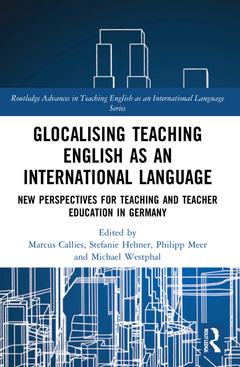Glocalising Teaching English as an International Language New Perspectives for Teaching and Teacher Education in Germany Routledge Advances in Teaching English as an International Language Series
Coordonnateurs : Callies Marcus, Hehner Stefanie, Meer Philipp, Westphal Michael

The worldwide spread, diversification, and globalization of the English language in the course of the twentieth and early twenty-first centuries has significant implications for English Language Teaching and teacher education.
We are currently witnessing a paradigm shift towards Teaching English as an International Language (TEIL) that aims to promote multilingualism and awareness of the diversity of Englishes, increase exposure to this diversity, embrace multiculturalism, and foster cross-cultural awareness. Numerous initiatives that embrace TEIL can be observed around the world, but ELT and teacher education in Germany (and other European countries) appear to be largely unaffected by this development, with standard British and American English and the monolingual native speaker (including the corresponding cultural norms) still being very much at the center of attention. The present volume addresses this gap and is the first of its kind to showcase recent initiatives that aim at introducing TEIL into ELT and teacher education in Germany, but which have applicability and impact for other countries with comparable education systems and ?traditional? ELT practices in the Expanding Circle. The chapters in this book provide a balanced mix of conceptual, empirical, and practical studies and offer the perspectives of the many stakeholders involved in various settings of English language education whose voices have not often been heard, i.e., students, university lecturers, trainee teachers, teacher educators, and in-service teachers.
It therefore adds significantly to the limited amount of previous work on TEIL in Germany and bridges the gap between theory and practice that will not only be relevant for researchers, educators, and practitioners in English language education in Germany but other educational settings that are still unaffected by the shift towards TEIL.
Introduction. Glocalising Teaching English as an International Language: New perspectives for teaching and teacher education in GermanyI. TEIL in language teacher education 1: An integrated approach to introducing TEIL in language teacher education at the interface of linguistics, language education and teaching practice2: Global Englishes in the second phase of teacher education in Germany: Teacher educators’ perspectives on ELT and teacher education 3: Tomorrow’s teachers’ perceptions of Global Englishes 4: Standard language ideology in the English language classroom: Suggestions for EIL-informed teacher education II. TEIL in the curricula 5: Global Englishes in the secondary school curriculum in Germany: A comparative analysis of the English language curricula of the federal state 6: Global Englishes in ELT and teacher education in Bavaria – progress and missed opportunities 7: Sociolinguistic competence and TEIL: A study of the sociolinguistic awareness and perceptions of be like among German learners of English 8: Cultural Learning for and through Global Englishes III. Innovative teaching material and activities for the TEIL classroom 9: Teaching materials for TEIL: Focus on Indian English 10: Pop music and Teaching English as an International Language 11: Encountering Global Englishes in the ELT classroom through audio-visual texts: The example of TED talks Epilogue
Marcus Callies is full professor and Chair of English Linguistics at the University of Bremen. His main research interests are corpus linguistics with a focus on lexico-grammatical variation and innovation in advanced learner varieties of English and World Englishes, Learner Corpus Research, teacher education, conceptual metaphor, and the language of sports.
Stefanie Hehner received her first teaching degree (equivalent to M.Ed.) in 2016 from the University of Gießen, Germany. She is currently a PhD candidate at the University of Bremen, Germany, working in the teaching and research project "Varieties of English in Foreign Language teacher education". Her research interests include Global Englishes, teacher cognitions, and the interface between linguistics and English language pedagogy.
Philipp Meer is a PhD student and research assistant at the Chair of Variation Linguistics at the University of Münster, Germany, where he has worked since 2016. He is co-affiliated with the Speech Prosody Studies Group at the University of Campinas, Brazil. His research interests include World Englishes, sociophonetics & sociolinguistics, acoustic phonetics, speech prosody, language attitudes, and applied linguistics.
Michael Westphal is a postdoctoral researcher at the Chair of Variation Linguistics at the University of Münster, Germany, where he also received his PhD in English linguistics in 2016 for his work on language variation on Jamaican Radio (published with John Benjamins in 2017). His research interests include World Englishes, language attitudes, variational pragmatics, and language in the media.
Date de parution : 09-2023
15.6x23.4 cm
Date de parution : 12-2021
15.6x23.4 cm
Thèmes de Glocalising Teaching English as an International Language :
Mots-clés :
EIL; Global Englishes; Language Awareness; English Language Teaching; Elt Classroom; English as an International Language; Elt; Language Ideologies; GELT; Outer Circle Englishes; Outer Circle Varieties; Sociolinguistic competence; Standard Language Ideology; ICC; Englishes World Wide; Expanding Circle Country; Elf; Sociolinguistic Awareness; English Language Curricula; Social Attractiveness; Lingua Franca; Intercultural Competences; Teacher Education; Local Partner Schools; International Language; Native Speaker Norms; CEF; Standard BrE



